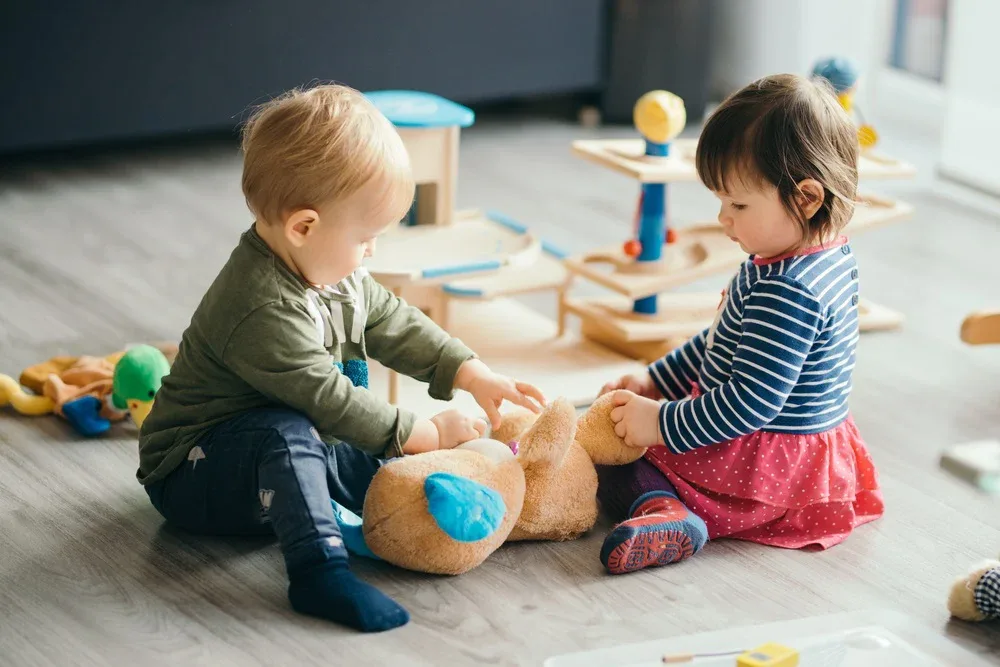 Looking for an answer to “should i put my child in daycare?” Putting your child in daycare is a significant decision for many parents, one that often requires careful consideration of various factors, including the child’s age, the family’s circumstances, and the available childcare options.
Looking for an answer to “should i put my child in daycare?” Putting your child in daycare is a significant decision for many parents, one that often requires careful consideration of various factors, including the child’s age, the family’s circumstances, and the available childcare options.
It’s not merely about finding a place for your child to spend the day; it’s about their development, socialization, and overall well-being, all of which are crucial aspects of early childhood education and care. In this article, we’ll delve into the complexities of this decision, addressing common questions and concerns surrounding daycare.
Contents
- 1 What is the Best Age to Send a Child to Daycare?
- 2 Why Daycare is Important?
- 3 Should I Put My Child in Daycare?
- 4 Is it Healthy for Babies to Go to Daycare?
- 5 Is Daycare Stressful for Children?
- 6 Do Kids Behave Better at Daycare?
- 7 How Do I Cope with Leaving My Child at Daycare?
- 8 How Long Does it Take a 1-Year-Old to Adjust to Daycare?
- 9 How Long Does it Take for Babies to Get Used to Daycare?
- 10 FAQs
- 11 Conclusion
What is the Best Age to Send a Child to Daycare?
Many parents grapple with the question of the optimal age to enroll their child in daycare. While no definitive answer applies to every child, experts generally suggest that 18 months to 3 years old is an ideal age range.
During this period, children typically begin to develop social skills and benefit from interactions with peers, making daycare a valuable opportunity for growth and learning. However, it’s essential to consider each child’s unique needs and temperament when making this decision, as what works for one child may not necessarily be the best choice for another. Learn more:
What’s the Best Age to Start Daycare?
Why Daycare is Important?
Daycare plays a crucial role in the lives of many families, offering a supportive environment for children’s growth, development, and learning. It serves as more than just a place for parents to entrust their children while they work or attend to other responsibilities; daycare provides a foundation for socialization, education, and emotional well-being during the formative years of childhood. Learn more:
Why Daycare is Important? 10 Significant Reasons
Should I Put My Child in Daycare?
Daycare plays a pivotal role in shaping children’s holistic development, offering many benefits that extend far beyond simple supervision. From fostering socialization skills to nurturing cognitive and emotional growth, daycare provides a supportive environment where children can thrive and reach their full potential. In this section, we will explore how daycare positively impacts young children’s development, highlighting its significance in laying the groundwork for lifelong learning and success. Learn more:
Positive Effects of Daycare on Child Development
Socialization Skills
One of the most significant advantages of daycare is its role in fostering socialization skills in children. Children learn important social skills such as sharing, cooperation, and communication by interacting with peers and caregivers in a structured environment. These interactions lay the foundation for healthy relationships and social competence later in life.
Additionally, exposure to diverse backgrounds and experiences in daycare settings helps children develop empathy, tolerance, and respect for others, essential qualities for navigating the complexities of the modern world.
Cognitive Development
In addition to socialization, daycare can also contribute to cognitive development in young children. Structured activities and educational programs in daycare settings stimulate intellectual growth and help prepare children for academic success.
Exposure to new experiences, materials, and learning opportunities enhances their cognitive abilities and promotes school readiness. Furthermore, daycare environments often offer rich language experiences and opportunities for problem-solving and critical thinking, essential skills for success in school and beyond.
Emotional Development
Daycare environments play a crucial role in supporting emotional development in children. By providing a safe and nurturing space for children to explore and express their emotions, daycare helps them develop emotional resilience and independence.
Learning to navigate various social situations and manage emotions in a supportive setting prepares children for future challenges and transitions. Additionally, daycare provides opportunities for children to develop strong relationships with caring adults outside of their immediate family, which can enhance their sense of security and belonging.
Is it Healthy for Babies to Go to Daycare?
Many parents express concerns about the potential health implications when considering daycare for their babies. However, contrary to common misconceptions, daycare can have several health benefits for babies. Exposure to different environments and germs in daycare settings helps strengthen their immune systems, reducing the risk of illnesses later in life.
Research has shown that children who attend daycare during their early years may have fewer respiratory infections and allergies than those who stay home. Additionally, daycare provides opportunities for babies to engage in physical activity and explore their surroundings, which are essential for their overall health and development.
Is Daycare Stressful for Children?
While it’s natural for children to experience some stress when starting daycare, it’s essential to recognize that this stress is often temporary and manageable. Children may feel anxious or apprehensive initially as they adjust to the new routine and environment. Still, with time and support from caregivers, they typically adapt well and thrive in daycare settings.
However, parents and caregivers must be attentive to children’s emotional needs during transition and provide reassurance and comfort. Creating a predictable and nurturing environment in daycare can help alleviate children’s stress and promote their overall well-being.
Do Kids Behave Better at Daycare?
Children’s behavior at daycare can vary depending on individual factors such as temperament, previous experiences, and the quality of the daycare center. However, in many cases, daycare provides a structured environment with opportunities for learning and socialization, which can positively influence behavior and promote positive social interactions among children.
Research has shown that children who attend high-quality daycare programs are likelier to exhibit prosocial behaviors such as sharing, cooperation, and empathy than their peers who do not attend daycare. Additionally, daycare settings often provide opportunities for children to learn and practice essential social skills such as conflict resolution, self-regulation, and emotional expression, which can contribute to their overall development and well-being.
How Do I Cope with Leaving My Child at Daycare?
Leaving your child at daycare can be a challenging experience for many parents, eliciting emotions ranging from guilt and worry to relief and anticipation. Whether you’re returning to work, pursuing personal commitments, or simply seeking additional support with childcare, the decision to entrust your child to the care of others can feel overwhelming.
However, it’s essential to recognize that feeling apprehensive about leaving your child at daycare is normal and understandable. In this article, we’ll explore practical strategies and emotional coping mechanisms to help you navigate this transition confidently and easily, ensuring you and your child feel comfortable and supported throughout the daycare experience.
How Do I Cope with Leaving My Child at Daycare?
How Long Does it Take a 1-Year-Old to Adjust to Daycare?
The adjustment period for a 1-year-old starting daycare can vary from child to child and depends on various factors such as temperament, previous experiences, and the quality of the daycare environment. While some children may adapt quickly within a few days or weeks, others may require more time to feel comfortable in their new surroundings.
Patience, consistency, and reassurance from caregivers play key roles in facilitating a smoother transition for young children. Additionally, maintaining open communication with daycare staff and actively involving parents in the transition process can help support children’s adjustment to daycare and promote their overall well-being.
How Long Does it Take for Babies to Get Used to Daycare?
Babies adapt to daycare at their own pace, influenced by temperament, previous experiences, and parental support. While some babies may settle in relatively quickly, others may need more time and patience to acclimate to their new environment. Parents can support their babies’ transition by gradually introducing them to daycare routines and providing comfort and reassurance during the adjustment period.
Maintaining a consistent and predictable schedule at home can help babies feel secure and confident as they navigate daycare challenges. Parents should remain patient and supportive during this transition period and communicate openly with daycare staff about their child’s needs and preferences.
FAQs
What should I look for in a daycare center?
When choosing a daycare center, look for licensed and accredited facilities with qualified staff, safe environments, and a curriculum that promotes holistic development. Additionally, factors such as the center’s location, hours of operation, and philosophy on early childhood education and care should be considered.
Can daycare affect a child's attachment to parents?
While daycare can foster a child’s independence and social skills, it doesn’t necessarily impact the bond between child and parent. Research suggests that secure attachment relationships with parents provide a foundation for healthy development and resilience in children, regardless of their childcare arrangements. Maintaining consistent routines, spending quality time together, and responding sensitively to your child’s needs is essential for nurturing attachment and supporting your child’s overall well-being.
How can I prepare my child for daycare?
Transitioning to daycare can be a significant adjustment for young children and their families. To help prepare your child for this transition, consider visiting the daycare center together before their first day to familiarize them with the environment and meet their caregivers. Additionally, talk to your child about what to expect at daycare, reassure them that you’ll be there to pick them up at the end of the day, and provide comfort items such as a favorite toy or blanket to help them feel secure.
What are the signs of a good daycare center?
Signs of a good daycare center include a warm and nurturing atmosphere, positive interactions between staff and children, and clear communication with parents about their child’s progress and well-being. Additionally, look for daycare centers that prioritize safety and cleanliness, provide age-appropriate activities and learning opportunities, and have low staff turnover rates.
Is it normal for children to cry when starting daycare?
Yes, it’s common for children to experience separation anxiety when starting daycare, especially during the initial transition period. Crying, clinginess, and reluctance to separate from parents are typical responses to the unfamiliar environment and temporary separation from caregivers. However, with time and support from parents and daycare staff, most children adjust well to daycare and develop a sense of security and comfort in their new environment.
Conclusion
Deciding whether to enroll your child in daycare is a personal decision that requires careful consideration of various factors, including your child’s age, developmental needs, and family circumstances. While daycare offers numerous benefits for child development, it is essential to weigh the options and choose a daycare center that aligns with your family’s values and priorities.
Want to put your child in daycare? Look no further. At DeeCyDa Daycare in Irvine, we’re committed to providing a nurturing and safe environment for your little one with our infant care program. Our experienced caregivers, structured routines, and dedication to your child’s well-being make us the top choice for parents like you. Contact us now!

